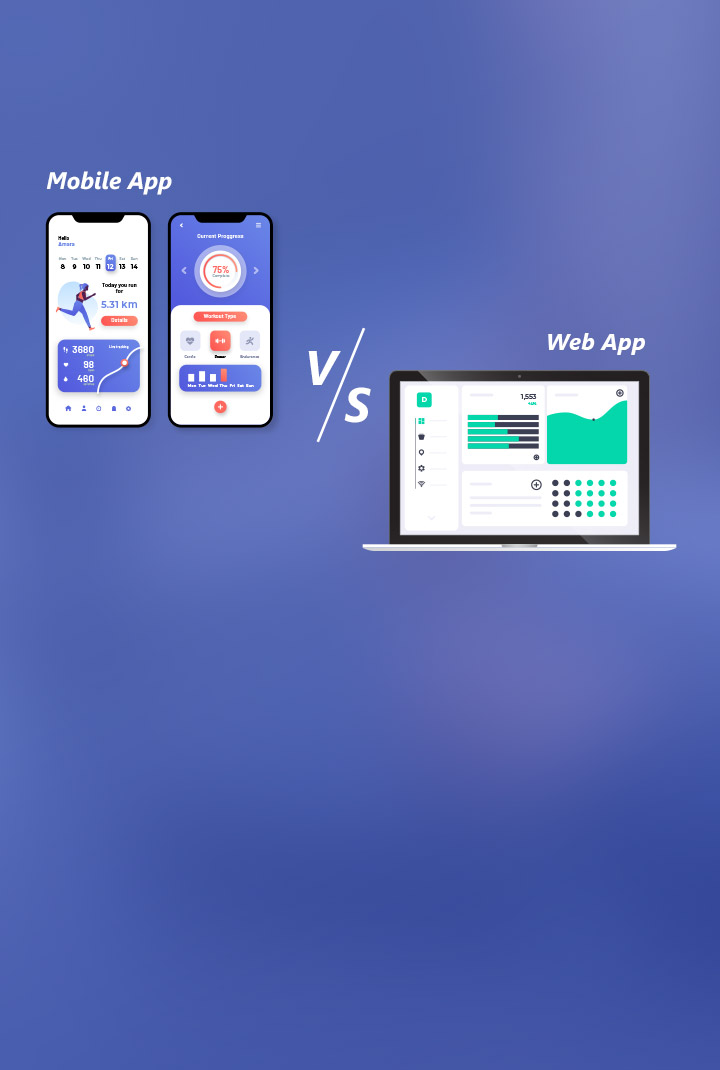What is a Mobile App?
A mobile app is a software application written for handheld devices such as smartphones and tablets. Apps can be downloaded from app stores or official websites and provide users with an enhanced digital experience to access content, play games, receive promotions, and engage with other users.
The increasing popularity of mobile apps has created a vibrant market for mobile and web developers who specialize in creating user-friendly digital experiences for end-users.
Additionally, the booming market for mobile apps presents businesses with countless opportunities to reach new audiences and gain additional profits through monetization strategies such as in-app purchases and advertisements.
What is An Example Of a Mobile App?
One example of a mobile app is Instagram. With the increasing popularity of smartphones, apps have exploded onto the scene and have become part of our daily lives.
Instagram is one such app, allowing users to instantly share photos and videos with their friends and followers. Thanks to its easy-to-use interface, millions of people across the globe can stay connected, discover other content, and explore new interests 24/7.
The possibilities are endless, with users able to edit photos and videos, start conversations in direct messaging channels, or create stories for their followers.
In this way, apps like Instagram illustrate how technology can help us explore creativity and connect with those around us – whenever and wherever we are!

Pros of Mobile Application
01Increased Customer Engagement
Mobile applications can help to increase customer engagement by providing a convenient and interactive way for them to connect with your business. Customers can use your app to book appointments, make purchases, or simply learn more about your products and services.
02Improved Customer Loyalty
A mobile app can also help to improve customer loyalty by providing a direct channel of communication between you and your customers. With an app, you can send push notifications to keep customers updated on new products, sales, or other important information. Additionally, you can use your app to collect customer feedback and address any concerns they may have.
03Increased Sales
A mobile app can also help to increase sales by making it easier for customers to purchase your products and services. Customers can use your app to browse your product catalogue, view pricing information, and place orders with just a few clicks. Additionally, you can use your app to upsell customers on complementary products or services.
04Improved Customer Service
A mobile app can also help to improve customer service by providing a convenient way for customers to get in touch with you. Customers can use your app to contact you via phone, email, or live chat, and they can also access your FAQs or Knowledge Base for answers to common questions.
05Reduced Marketing Costs
Mobile apps can also help to reduce marketing costs by providing a cost-effective way to reach your target audience. With an app, you can push notifications directly to customers’ phones, eliminating the need for costly print or television advertising. Additionally, you can use your app to collect customer data that can be used for targeted marketing campaigns.
06Increased Brand Awareness
A mobile app can also help to increase brand awareness by putting your brand name and logo in front of customers on a daily basis. Customers who see your brand regularly are more likely to remember it when they are ready to make a purchase. Additionally, a well-designed app can create a positive impression of your brand that will encourage customers to recommend you to others.
07Improved Time Management
A mobile app can also help you to improve time management by automating tasks such as appointment scheduling, customer follow-up, and invoicing. By automating these tasks, you will free up more time that you can spend on other aspects of running your business. Additionally, an app can help you keep track of important deadlines and appointments so that you never miss an important date again.

Cons of Mobile Application
- Mobile apps can be a drain on your battery life.
- Mobile apps can be a source of malware and other security threats.
- Mobile apps can be a source of privacy and security concerns.
- Mobile apps can be a source of data usage concerns.
- Mobile apps can be a source of distraction.
- Mobile apps can be a source of data storage issues.
- Mobile apps can be a source of compatibility issues.
- Mobile apps can be a source of customer service issues.
- Mobile apps can be a source of financial concerns.
- Mobile apps can be a source of legal concerns.
Programming Languages for Mobile Application Development
- Java
- Objective-C
- Swift
- C#
- HTML5
- Swift
- C++
- Python


Why Use Web Apps?
Web applications offer many advantages over traditional desktop applications, including cost savings, portability, and accessibility. Since there is no need to purchase or install any software, users can access the application from any device with an internet connection.
This allows for greater flexibility and convenience when it comes to using your favorite applications from anywhere in the world.
Additionally, since web apps are hosted on servers rather than stored locally on your computer, there is less of a chance of data loss due to hardware failure or other technical issues.
What are Some Examples of Web Apps?
There are hundreds of popular web apps used by millions of people every day. Some common examples include
- Google Calendar and Docs for managing projects and tasks;
- Dropbox for file storage;
- Spotify for streaming music;
- Slack for work communication;
- WhatsApp for messaging;
- Instagram for posting photos;
- Netflix for watching movies and TV shows online;
- Zoom for video conferencing;
- Amazon Prime Video for streaming videos online;
- Gmail for email management;
- Twitter for micro-blogging;
- Pinterest for social sharing;
- YouTube for video hosting;
- Trellofor project management ;
- and Facebook Messengerfor chatting with friends.
As you can see, there are many different types of web apps available that make life easier in some way or another!

Pros of Web Application
01Increased Productivity
Web applications can help to increase productivity as they can be accessed from anywhere in the world and from any device. This means that employees can work from home, on the go, or even while on vacation. Additionally, web applications can be used to automate tasks that would otherwise be completed manually, such as data entry or report generation.
02Reduced Costs
Another benefit of web applications is that they can help to reduce costs. Web applications are typically more affordable than traditional software applications as they do not require expensive hardware or software licenses. Additionally, web applications can be hosted remotely, which eliminates the need for on-site infrastructure.
03Improved Collaboration
Web applications can also improve collaboration among employees as they allow for real-time collaboration and communication. For example, employees can use a web-based project management application to track tasks, deadlines, and progress. Additionally, many web applications offer chat and video conferencing features that make it easy for employees to connect with each other no matter where they are in the world.
04Increased Customer Engagement
Web applications can also help to increase customer engagement as they provide a convenient way for customers to access information and services 24/7. Additionally, web applications can be used to create a personalized experience for each customer, which can help to build loyalty and brand awareness.
05Global Reach
Another benefit of web applications is that they have a global reach as they can be accessed from anywhere in the world with an internet connection. This is beneficial for businesses as it allows them to target new markets and expand their customer base. Additionally, it allows businesses to provide their services and products to a wider audience.
06Increased Sales
Web applications can also help to increase sales by providing customers with a convenient way to purchase products and services online. Customers can browse your product catalog and make purchases without having to visit your brick-and-mortar store. This is especially beneficial for companies that sell products or services that are not available in physical stores.
07Flexibility
Web applications are also very flexible as they can be easily customized to meet the specific needs of a business or organization. Additionally, web applications can be integrated with other systems, such as CRM or ERP systems. This makes it easy for businesses to manage all of their data in one place and provides a more seamless experience for employees and customers alike.
08Enhanced Security
When compared to traditional software applications, web applications typically offer enhanced security features. For example, many web applications offer two-factor authentication, which requires users to enter both a username and password before accessing the application. Additionally, many web applications are hosted on secure servers that are protected by firewalls and other security measures.

Cons of Web Application
- Web applications can be less secure than traditional desktop applications.
- Web applications can be more difficult to use than traditional desktop applications.
- Web applications can be more expensive to develop and maintain than traditional desktop applications.
- Web applications can be less reliable than traditional desktop applications.
- Web browsers can be less stable than traditional desktop application platforms.
- The user interface of a web application can be more complex than a traditional desktop application.
- Web applications can require a higher level of technical expertise to develop and maintain than traditional desktop applications.
- Web applications can be more difficult to deploy than traditional desktop applications.
- Web applications can be more difficult to scale than traditional desktop applications
Programming Languages for Web Application Development
- MySQL
- Ruby on Rails
- Django
- ASP .NET
- HTML
- CSS
- JavaScript
- PHP
- Node.js

Which is a Better Web App or Mobile App?
Deciding whether to develop a web app or a mobile app (or both) is one of the first decisions you’ll face when starting any new app development project. Both have their own unique set of pros and cons that need to be considered before making a final decision.

Web Apps
Web apps are apps that are accessed via a web browser. They are typically developed using HTML, CSS, and JavaScript and can be deployed to a server for use by anyone with an internet connection.
One of the big advantages of web apps is that they can be accessed from any device with a web browser, making them very versatile. They also don’t require any installation, which makes them very easy to use.
The main downside of web apps is that they can be slower and less responsive than native mobile apps.
This is because they need to load all of the necessary HTML, CSS, and JavaScript every time they are accessed, which can take longer on slower internet connections.
Additionally, because they are reliant on a web browser, they can be more susceptible to security issues.
Mobile Apps
Mobile apps are apps that are installed directly on a user’s mobile device. They are typically developed using specific programming languages for each platform (e.g., Swift for iOS, Java for Android).
Mobile apps have the advantage of being much faster and more responsive than web apps because they don’t need to load all of their content every time they are used.
They also have access to many features of the user’s device, such as the camera, GPS, and contacts list, which can make them more powerful and useful than web apps.
The main downside of mobile apps is that they need to be developed specifically for each platform (e.g., iOS, Android), which can be more time-consuming and expensive than developing a single web app.
Additionally, because they are installed on a user’s device, they can take up valuable storage space and require regular updates to keep them running smoothly.

Key Functionality of Mobile Apps vs Web Apps
- Mobile apps are designed specifically for use on mobile devices, while web apps can be accessed on any internet-connected device.
- Mobile apps are typically faster and more responsive than web apps, as they are designed specifically for the hardware and software of mobile devices.
- Mobile apps can make use of the unique features of mobile devices, such as GPS and push notifications, while web apps cannot.
- Mobile apps can be designed to work offline, while web apps require an internet connection.
- Mobile app users are typically more engaged and have a higher retention rate than web app users.
- Mobile app development is typically more expensive and time-consuming than web app development.
- Mobile apps must be submitted to and approved by app stores before they can be downloaded by users, while web apps do not undergo this process.
- Users must install mobile apps on their devices before they can use them, while they can simply bookmark web apps for easy access.
- Unused mobile apps can be uninstalled by users to free up space on their devices, while unused web apps will remain stored on the user’s device indefinitely.
- Mobile app developers must adhere to the guidelines set by each app store, while there are no such restrictions for developers of web apps

What To Choose?
There is no clear winner when it comes to deciding between web apps vs mobile apps. The decision ultimately comes down to your specific needs and goals for the app.
If you need something that is fast and responsive with access to native device features, then a mobile app is probably your best bet.
However, if you need something that can be easily accessed by anyone with an internet connection and doesn’t take up valuable storage space on users’ devices, then a web app might be the way to go.
Ultimately, the best decision is to consult with a professional app development company to get their expert opinion on which type of app is right for your project.
What is The Difference Between a Web App And a Mobile App?
- A web app is a software application that is accessed via the internet. A mobile app, on the other hand, is a software application that is designed to be used on a mobile device such as a smartphone or tablet.
- Web apps are typically developed using web technologies such as HTML, CSS, and JavaScript. Mobile apps, on the other hand, are usually developed using native programming languages such as Objective-C or Java.
- Web apps are typically accessed via a web browser, while mobile apps are accessed via an app store or marketplace.
- Web apps are usually designed to be used by anyone with an internet connection, while mobile apps are designed to be used by people with specific mobile devices.
- Web apps are often designed to be used on multiple devices, while mobile apps are usually designed for use on a single device.
- Web apps can be used offline, while mobile apps must be connected to the internet in order to function.
- Web app development is typically cheaper and faster than mobile app development.
- Mobile apps tend to have better performance and user experience than web apps.
- Mobile apps can take advantage of features of specific mobile devices (such as GPS and push notifications), while web apps cannot.
- Mobile apps must go through an approval process in order to be listed in an app store, while web apps do not
Mobile App vs. Web App Which One Should You Choose?
As you can see, there are pros and cons to both web apps and mobile apps. The best option for your business depends on your specific needs and goals.
If you want to reach the widest possible audience with minimal development costs, then a web app is probably your best bet.
But if you’re looking to create a more engaging user experience with access to additional features, then you’ll need to develop a native app for each different type of mobile device you want to support.
Whether speed or accessibility are important factors, determine how they might play into the success of an engaging experience through either type of software development!


